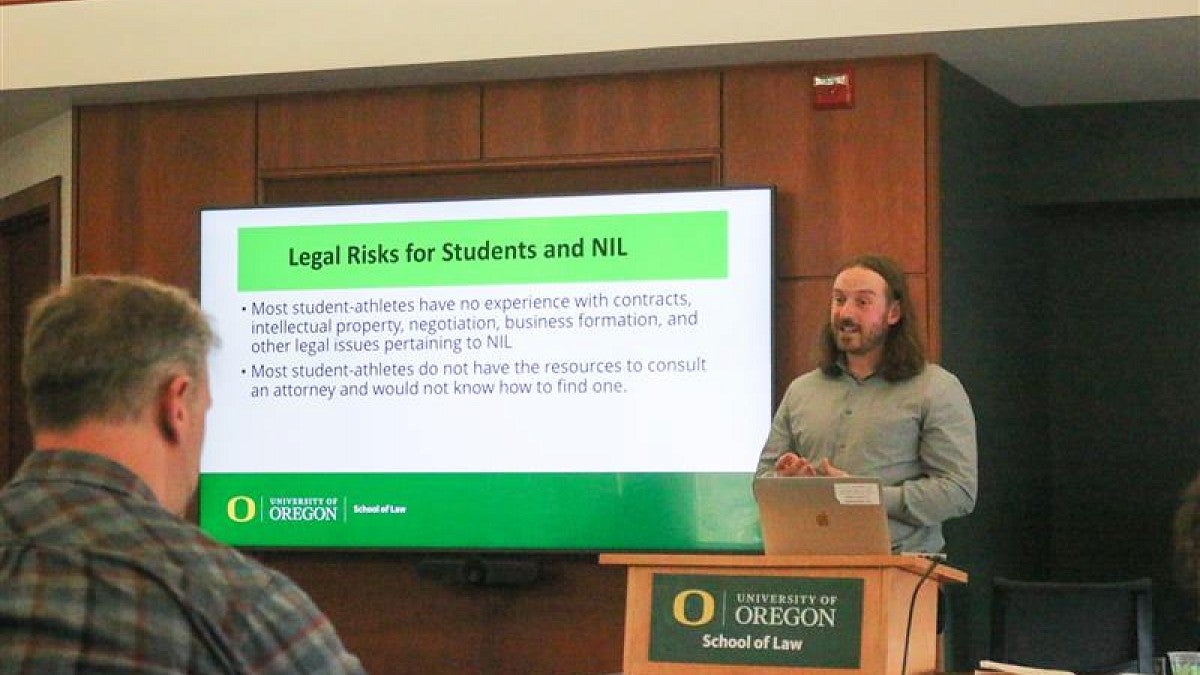In 2021, the NCAA announced new rules that allowed student-athletes to be compensated for the use of their name, image and likeness, rules that also apply to any student in Oregon, thanks to recent changes in state law.
To address the growing need for NIL legal assistance, the Business Law Clinic, a class offered at the University of Oregon School of Law, offers student clients free NIL contract review and education.
On average, the UO reports four NIL deals a day on Opendorse, a platform for individuals to search for NIL opportunities. Student-athletes, musicians and social media influencers who have been offered an NIL deal often have no experience with contracts, intellectual property, negotiation, taxes or other legal issues related to NIL contracts. They might also lack the resources to consult an attorney or even know how to find one.
According to Professor Laurie Hauber, director of experiential education and assistant clinical professor of law, free legal assistance from the clinic can help students make an educated decision on whether to enter into an NIL deal or negotiate terms.
“We help students not only understand what their rights are but how to protect those rights,” she said. “We don’t tell the student you should or shouldn’t enter this contract; we educate the student on what the provisions mean to help the student do a risk analysis.”
Two particularly troubling provisions that students should look out for, she said, are perpetuity clauses where the business is entitled to use that person’s name and likeness forever, and exclusivity, meaning they are bound and limited to only working with a certain company at the expense of other business deals.
Under the supervision of a law professor who is also a practicing attorney, law students enrolled in the clinic class review the contract, which can be a formal written document or simply the exchange of online communications between the business and the student via email, Instagram or marketplace platforms like Opendorse. They receive assistance in navigating expected deliverables: particulars students agree to, such as posting on social media, appearances and speaking engagements, photoshoots, or autograph signings.
Law students also clarify the meaning of legal terms, help students avoid being taken advantage of by third parties, ensure that all NIL deals are compliant with the law and NCAA regulations, provide information about taxes and other legal concerns, and connect students with other resources.
“To actually work with clients is unique in a law school setting,” Hauber said. “An important skill for lawyers is being able to translate complex legal content into easy-to-understand language, both in writing and presentation, so students are building their legal skills for future practice after they graduate.”
Justin Johnson, a 2022 public relations graduate, is a UO graduate student in advertising and brand responsibility at the School of Journalism and Communication. He also is the strategy director and student-athlete insights and playbook liaison with Oregon Accelerator, a student led, faculty-driven program working to elevate NIL opportunities.
He said he used the clinic’s services for contract negotiations when he was a student-athlete.
“They provided very good feedback and review of my contract, and everything was free of charge,” he said. “They go over inclusivity and licensing that you may not be aware of in a contract. It’s an exceptional service for someone who isn’t well legally versed.”
For second-year law students Jacob Barham and Jordan Clark, who are currently enrolled in the Business Law Clinic course, it’s also been a great hands-on learning opportunity to develop valuable business legal skills and build a strong foundation in relevant substantive law.
“The clinic offers experience that can build career skills like public speaking, interpersonal communication, contract drafting, etc., that can transfer into being a successful practitioner,” Barham said. “It has allowed us to do real ‘lawyer’ work, which is a nice change of pace from traditional lecture-style courses.”
Jordan Clark agrees. “Getting to work with an actual attorney has prepared me to be an attorney more than any other classroom setting can.”
The clinic also provides general educational sessions on NIL as well as more specialized topics related to NIL, such as trademark, copyright and tax law to groups, individual teams and student organizations. It also offers NIL education to individual undergraduate classes as guest lecturers and maintains an NIL legal resource library.
“If you’re not familiar with NIL legal terminology I highly recommend using the free services provided by the Business Law Clinic to all students and faculty,” Johnson said.
—By Sharleen Nelson, University Communications
—Top photo: Third-year law student Mica Weaver presenting to the law faculty colloquium about the NIL Clinic Program.


